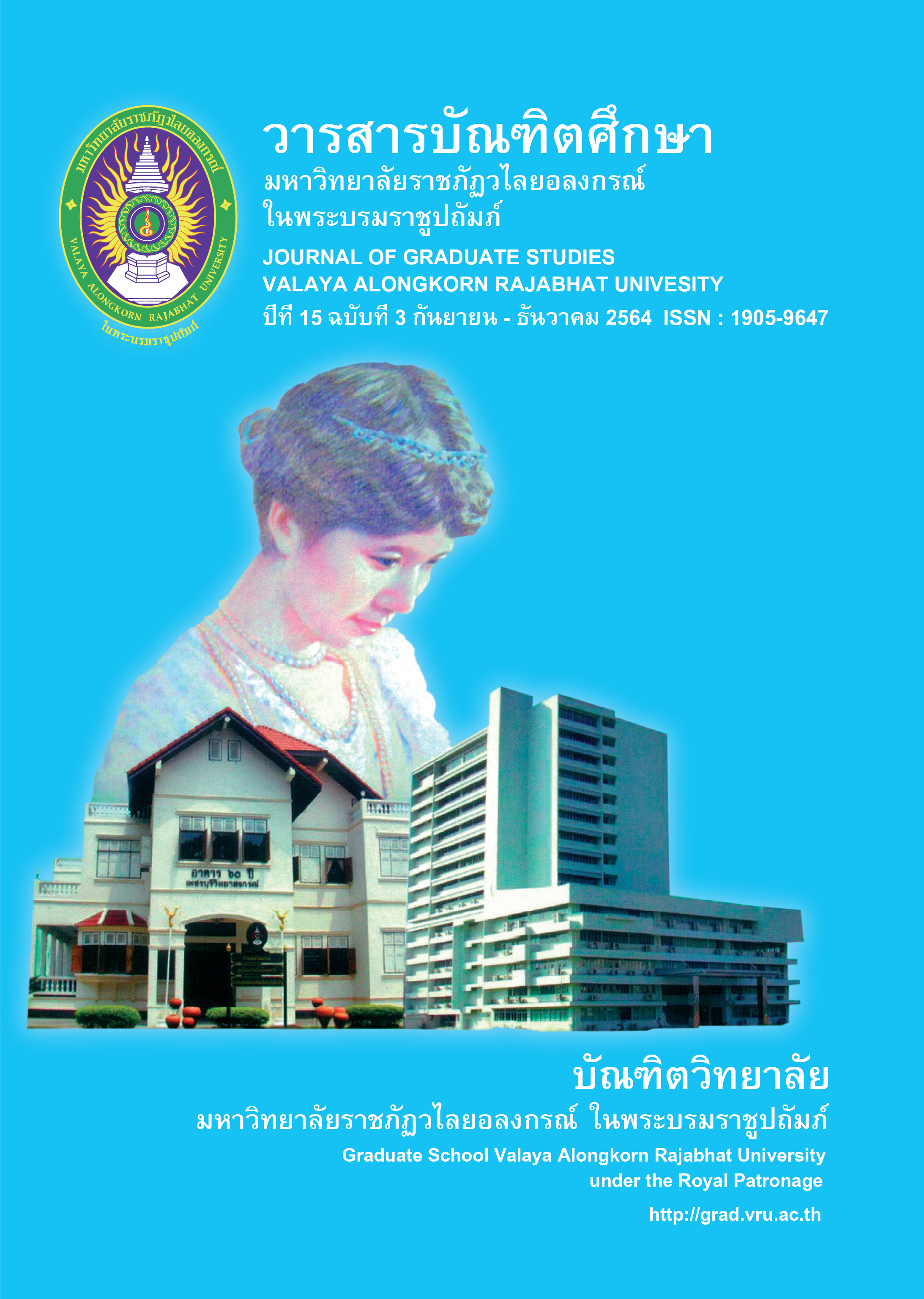การจัดการเรียนรู้โดยใช้ปัญหาเป็นฐานและแผนที่ความคิดเพื่อเสริมสร้างทักษะการเรียนรู้ในศตวรรษที่ 21 ของนักศึกษาที่เรียนในรายวิชาพิษวิทยาอาชีวอนามัย สำนักวิชาวิทยาศาสตร์สุขภาพ มหาวิทยาลัยราชภัฏเชียงราย
Main Article Content
บทคัดย่อ
การวิจัยชั้นเรียนนี้ มีวัตถุประสงค์เพื่อศึกษาการจัดการเรียนรู้โดยใช้ปัญหาเป็นฐานและแผนที่ความคิดเพื่อเสริมสร้างทักษะการเรียนรู้ในศตวรรษที่ 21 และเพื่อศึกษาความคิดเห็นต่อการจัดการเรียนรู้โดยใช้ปัญหาเป็นฐานและแผนที่ความคิดเพื่อเสริมสร้างทักษะการเรียนรู้ในศตวรรษที่ 21 ของนักศึกษาในรายวิชาพิษวิทยาอาชีวอนามัย ภาคการศึกษาที่ 1 ปีการศึกษา 2562 จำนวนทั้งหมด 18 คน เครื่องมือที่ใช้เป็นแผนการจัดการเรียนรู้โดยใช้ปัญหาเป็นฐานและแผนที่ความคิด แบบประเมินทักษะผู้เรียนในศตวรรษที่ 21 และแบบสอบถามความคิดเห็นการจัดการเรียนการสอน
ผลการศึกษาการจัดการเรียนรู้โดยใช้ปัญหาเป็นฐานและแผนที่ความคิดเพื่อเสริมสร้างทักษะการเรียนรู้ในศตวรรษที่ 21 พบว่า อยู่ในระดับมาก (=4.42,
=0.67) เมื่อพิจารณาเป็นรายด้าน พบว่า ทักษะด้านความร่วมมือทำงานเป็นทีมและภาวะผู้นำมีค่าเฉลี่ยมากที่สุด (
=4.77,
=0.67) รองลงมา คือ ทักษะด้านความเข้าใจความแตกต่างทางวัฒนธรรม (
=4.58,
=0.65) และค่าเฉลี่ยน้อยที่สุด คือ ทักษะด้านการสื่อสารสารสนเทศและรู้เท่าทันสื่อ (
=3.95,
=0.66) ส่วนความคิดเห็นของผู้เรียนต่อการจัดการเรียนรู้โดยใช้ปัญหาเป็นฐานและแผนที่ความคิดเพื่อเสริมสร้างทักษะการเรียนรู้ในศตวรรษที่ 21 พบว่า อยู่ในระดับมาก (
=4.60,
=0.47) เมื่อพิจารณาเป็นรายด้านพบว่า ด้านการสอนและเทคนิคการสอนมีค่าเฉลี่ยมากที่สุด (
=4.79,
=0.42) รองลงมา คือ ด้านการจัดกิจกรรมการเรียนรู้ (
= 4.71,
= 0.44) และค่าเฉลี่ยน้อยที่สุดคือด้านการวัดและประเมินผล (
= 4.20,
= 0.41)
Article Details
บทความทุกเรื่องได้รับการตรวจความถูกต้องทางวิชาการโดยผู้ทรงคุณวุฒิ ทรรศนะและข้อคิดเห็นในบทความวารสารบัณฑิตศึกษา มหาวิทยาลัยราชภัฏวไลยอลงกรณ์ ในพระบรมราชูปถัมภ์ มิใช่เป็นทรรศนะและความคิดของผู้จัดทำจึงมิใช่ความรับผิดชอบของบัณฑิตวิทยาลัย มหาวิทยาลัยราชภัฏวไลยอลงกรณ์ ในพระบรมราชูปถัมภ์ กองบรรณาธิการไม่สงวนสิทธิ์การคัดลอก แต่ให้อ้างอิงแหล่งที่มา
References
Bunjoon, et al. (2017). phonkān čhatkān rīanrū dōi chai panhā pen thān rūam kap phǣnphang khwāmkhit thī mī tō̜ khwāmsāmāt nai kān khit wikhro̜ læ phon samrit thāngkān rīan klum sāra kānrīanrū witthayāsāt khō̜ng nakrīan chan prathomsưksā pī thī sām [The Effect of Critical Thinking Ability and Science Achievement of Grade 3 Students by using Problem-Based Learning with Mind Maps]. Journal of Education Prince of Songkla University, Pattani Campus. 28(2).
Choengchao, C. (2007). rabīap withī wičhai thāngkān sưksā. pattānī: Khana Sưksāsāt mahāwitthayālai song khlā nakharin witthayākhētpattānī [Research Methods in Education]. Pattani. Faculty of Education. Songkla University, Pattani Campus.
Chaipichit, D. (2018). kānphatthanā kānčhatkān rīanrū nai satawat thī yīsipʻet khō̜ng khrū rōngrīan tamrūat tawēn chāidǣn radap prathom sưksā čhangwat ʻUbon rātchathānī [Development of learning in the 21st century of Border Patrol Teachers in Elementary Education in Ubon Ratchathani]. College of Asian Scholar Journal. 8(1), 157-164.
Dejsuk, et al. (2009). kānprīapthīap phon samrit thāngkān rīan witthayāsāt læ khwāmsāmāt nai kān khit wikhro̜ khō̜ng nakrīan chan prathomsưksā pī thī hok thī dai rap kānčhatkān rīanrū dōi chai panhā pen lak kap kānčhatkān rīanrū bǣp sư̄pso̜ hākhwām rū [A comparative results of learning achievement science and analytical thinking abilities of primary grade 6 students between problem-based learning and inquiry process]. Master of Education, Thaksin University.
Hakham, S. (2005). kānsưksā phon samrit thāngkān rīan wichā khanit sāttra khō̜ng nakrīan chan prathomsưksāpa thī hok thī chai theknik kān khit bǣp Mind Map nai khan sarup nư̄ahā dōi phū rīan rư̄ang samakān [A study of Mathematics Learning Achievement of Prathom Suksa 6 Students by Using the Mind Map Thinking Techniques in Summarizing the Content by Learners about the Equation]. Teacher Professional Development Project, Institute for the Promotion of Teaching Science and Technology.
Hinna. (2016). phonkān čhatkān rīanrū dōi chai panhā pen thān rūam kap kānchai phang krāfik thī mī tō̜ phon samrit thāngkān rīan chīwawitthayā kān khit wikhro̜ læ khwāmphưngphō̜čhai tō̜ kānčhatkān rīanrū khō̜ng nakrīan chan matthayommasưksā pī thī sī [Effect of Problem-Based Learning with Graphic Organizer on Biology Achievement, Analytical Thinking and Instructional Satisfaction of Grade 10 Students].Thesis for Master’s Degree. Songkhla: Prince of Songkla University.
Jaigla, et al. (2016). kānphatthanā thaksa kānrīanrū nai satawat thī yīsipʻet khō̜ng nakrīan chumnum wichākān rōngrīan chīang yư̄n phitthayākhom dūai kānčhat kitčhakam kānrīanrū dōi chai panhā [The Development in the 21st Century learning skills for students in academic group at Chiang Yuan Pittayakom School with Problem-based Learning]. Mahasarakham University: Public Devotion is a Virtue of the Learned. 226 - 234.
Khammanee, T. (2004). sāttra kānsō̜n [Teaching science]. Bangkok: The Publisher of Chulalongkorn. Chulalongkorn University.
Khumlongwarasiri, K. (2009). kānprīapthīap phon samrit thāngkān rīan wichā phāsā Thai rư̄ang chanit khō̜ng khamkhō̜ ngō̜ nakrīan chan matthayommasưksā pī thī nưng rōngrīan wat khīan khēt thī dai rap kānčhatkān rīanrū dōi chai phang manō that kap kānčhatkān rīanrū tām khūmư̄ khrū [A Comparison of Mathayomsuksa I Students’ Achievement in Thai Language on Words, Watkiankhet School, Through Concept Mapping Technique and the Teacher’s Manual]. Master’s Project, M.Ed. (Secondary Education). Bankok: Graduate School, Srinakharinwirot University.
Klomim, K. (2017). kānčhatkān rīanrū bǣp kānchai panhā pen thān: rāiwichā kān ʻō̜k bǣp læ phatthanā laksūt samrap naksưksā wichāchīp khrū [How to Learning Problem Based Problem Learning: Coursed Design and Development Coursed for Students Teachers]. Journal of Graduate Studies Valaya Alongkorn Rajabhat University. 11(2), 179 - 192.
Phakdichit, Y. (2014). kānrīanrū nai satawat thī yīsipʻet [Learning in the 21st Century]. Documentation for Academic seminar; Quality of teaching]. Faculty of Education, Nakhon Sawan Rajabhat University.
Pongphoka, S. (2014). kānphatthanā khwāmsāmāt nai kān khit kǣ panhā khō̜ng nakrīan chan matthayommasưksā pī thī hok dōi kānčhatkān rīanrū dūai theknik kān kǣ panhā ʻanākhot rūam kap phǣnphang khwāmkhit [The Development of Problem Solving Thinking Ability of Mutthayomsuksa 6 Students by Future Problem Solving Technique and Mind Mapping]. Thesis for Master’s Degree, Graduate School Program and Supervision Silpakorn University.
Schwartz, P., Mennin, S., & Webb, G. (2001). Problem-Based Learning. Case Studies, Experience and Practice. Kogan Page Ltd, London.
Sukwibun, T. (2009). khō̜ khamnưng nai kānsāng khrư̄angmư̄ praphēt māt pramān khā (Rating Scale) phư̄a ngānwičhai [Considerations to create a rating scale tool for research]. Retrieved from http://www.ms.src.ku.ac.th.
Trilling, B., & Fadel, C. (2009). 21st Century Skills: Learning for Life in Our Times. San Francisco, CA: Jossey-Bass.
Waltons & Matthews. (1998). Essentials of Problem Based Learning. Medical Education. 23: 456 - 459.

